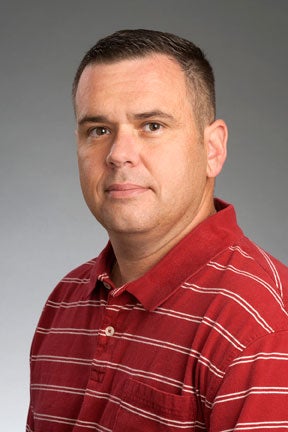
Research keeps Tedd McDonald busy. McDonald is a senior researcher for the Center for Health Policy (CHP) and the director of the Master of Health Science (MHS) program. The two roles complement each other nicely because using current, real-life data in the classroom makes his courses about statistics and research more engaging while exposing students to current research initiatives. McDonald is also able to recommend graduate students for assistantships with the center, where the graduate assistants get much sought-after experience.
McDonald was first introduced to research as a psychology doctoral student when he was invited to participate in a research study by the Center for Urban Initiatives and Research at the University of Wisconsin Milwaukee. He was exposed to people and real-world research applications in inner-city Milwaukee. McDonald saw first hand poverty, discrimination, and people’s lack of access to services. He found that he felt good about doing research that could benefit people and became particularly interested in helping vulnerable populations.
Today many of his research projects at the CHP involve evaluating services and processes that are used in systems in Idaho. His most recent contract is from the State of Idaho Office of Drug Policy to evaluate the Idaho Strategic Prevention Framework State Incentive Grant (SPF-SIG). SPF-SIG will be piloted in 10 to 12 Idaho communities, where prevention programming for marijuana use, prescription drug abuse, and alcohol abuse, particularly by minors, will be implemented. McDonald and his team at CHP will develop a statewide evaluation plan to assess the effectiveness of these substance use prevention efforts.
McDonald began his work with CHP as a faculty member in Boise State’s Department of Psychological Science. After meeting the director of the CHP, McDonald was requested to work on a housing access project focused on affordable housing. Other projects developed and McDonald began to routinely work on a CHP project each year, eventually obtaining his current position. He was introduced to a staff member in the Idaho Department of Juvenile Corrections (IDJC) while presenting findings from a study about parents’ perceptions of underage drinking. The IDJC staff member was impressed by McDonald’s work and when IDJC needed an evaluation, IDJC contacted McDonald.
In the evaluation for IDJC clinical services, McDonald examined the effectiveness of physicians working with the juvenile corrections system. If the physicians could identify substance abuse problems or mental health problems, then the juveniles could undergo an IDJC-supported treatment program. Often the children had been previously diagnosed, but had missed some or all treatment. McDonald’s evaluations and reports identified areas for improvement and helped realize the importance of the treatment program, eventually affecting state policy, when the state created a permanent budget line to support the program.
The project is now in its sixth year and McDonald finds satisfaction with how his research helps build, refine and support programs that have direct benefits for the community. The engagement process of the evaluation and presentations of McDonald’s research has had an unexpected impact. Judges, parole officers, and the heads of state agencies, have expressed interest in better understanding how to keep kids from exposure to trauma or to provide earlier intervention in hopes of keeping juveniles out of the system or reducing repeat offenders. More research, including McDonald’s work, shows that childhood trauma can influence behavior throughout a lifetime, including an increase in mental health and substance abuse disorders. Now a variety of people are asking “what can we do as a society to minimize childhood trauma?”
McDonald says “The enthusiasm and willingness of those not directly involved in IDJC services to use my team’s results is surprising.” Physicians are now undergoing training programs on how to assess trauma, developing trauma-informed care.
McDonald also serves as a mentor to other faculty researchers, by partnering on projects as a co-investigator. He provides guidance, particularly of a practical nature, so that other faculty can be more efficient with their project. McDonald states that having a faculty research mentor “would have been nice” when he was a junior faculty member, but he is pleased that he can offer advice and support now.
“A viable, well-led research center can do tremendous things for the college, the university and for the students and faculty working there,” said McDonald. “The center gets traction and develops a good reputation which thereby enhances the reputation of the university. It also demonstrates how the university can help improve the quality of life in communities. There’s exciting opportunities for faculty and students in the center.”